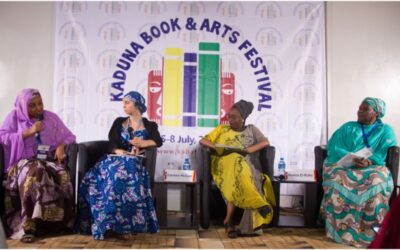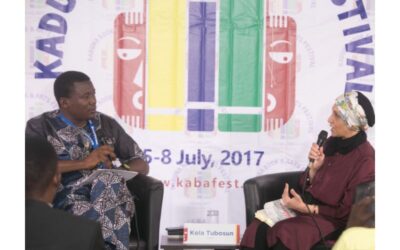Towards Religious Tolerance in Northern Nigeria
The conversation tagged “Towards Religious Tolerance in Northern Nigeria” began on a bright note, as Ahmed Kadaria the able moderator for this discourse introduced her guests and their impressive portfolios. In her words, they were “eminently qualified for this conversation”. Rev. Joseph Hayab as the secretary of the Christian Association of Nigeria and works for the global peace foundation and Dr Usman Bugaje as a strong stakeholder in interreligious dialogue and peace building in Northern Nigeria gave the conversation a sense of balance.
Hayab argued that the North has an uncanny character, being both a multicultural and multi-religious setting. He debunked the notion of the north as a monolithic entity. He stated that an average northerner had always been a peace-loving person who idolised his neighbour. He cited instances where in his native Ham community, a Ham man gave his son a Hausa name, a Hausa man from Sokoto gave his son a name that in Ham language. In fact, his name Hayab was derived from a Hausa man’s name when he worked in Kano. The thrust of his opening argument was that the peasant population in Northern Nigeria were not the actors of ethno-religious intolerance in Northern Nigeria.
He identified the elite and political class as the dividing line in Northern Nigeria. These elite invoke religion as a tool to achieve selfish purposes. He defined the character of religion as being malleable or flexible; and this made it a potent tool for the destruction of society.
Religion he argued was most times manipulated by the political class and religious leaders to protect certain privileges. He condemned the enthronement of sentiments in political appointments instead of competence. He argued that the late Sardauna, Sir Abubakar Tafawa Balewa ran an all-inclusive government that gave equal opportunities to all. But, the crops of politicians today in the core north saw him as a weak leader who gave too much power to minorities. He stressed that this unfair political climate gave birth to religious intolerance.
In a rhetorical style, he asked “when you are sick, do you ask for a Christian or Muslim Doctor, or a competent hand that is experienced and can heal you?; When your vehicle breaks down, do you ask for a mechanic that is an expert or do you ask for a Muslim or Christian mechanic? He further stated that when the Super Eagles were in the field of play, the soul of the nation was one. He asked that during this football matches, which prayer did the say? Which one works?
Bugaje hinged his argument on the fact that religious intolerance in Northern Nigeria was motivated by bad governance. He stressed that injustice had been an open wound that only truth could heal. Bad policies he argued have ensured that the educational standards to remain low. The level of one’s education to a large extent determined the level of his tolerance for the other. Education encouraged individuals to probe issues and not to swallow any information they heard. He cited the case of forwarding messages on social media without proper interrogation of the issues raised in as an emblematic example of failed education system, starting with the individual.
He faulted the rise of foreign donor organisations that sponsored religious bodies in Northern Nigeria. He said these sponsors did not have the interest of the nation at heart.
He suggested a form of regulation for preachers of all faiths. He said the parameters used for admittance into the Ulamaa (a body of Islamic preachers) must be closely monitored. It seems people just listened to cassettes, spoke good Arabic, grew a beard and wore jump-up trousers to become Mallams. The inadequate communication between the two faiths also posed problems. Whenever there was an interface for genuine dialogue, both faiths withheld important details and seemed to compromise when there was money involve.
He argued that leaders must take responsibility for their failures and the only way to solve the problem of religious intolerance will be if the act of governance would be corrected and the right crops of leaders elected. On the other hand, Hayab argued that to solve the issue of religious intolerance, leaders must be humane and not arrogant in order to run their affairs. He further suggested that there must be a channel of communication between government and the populace.


